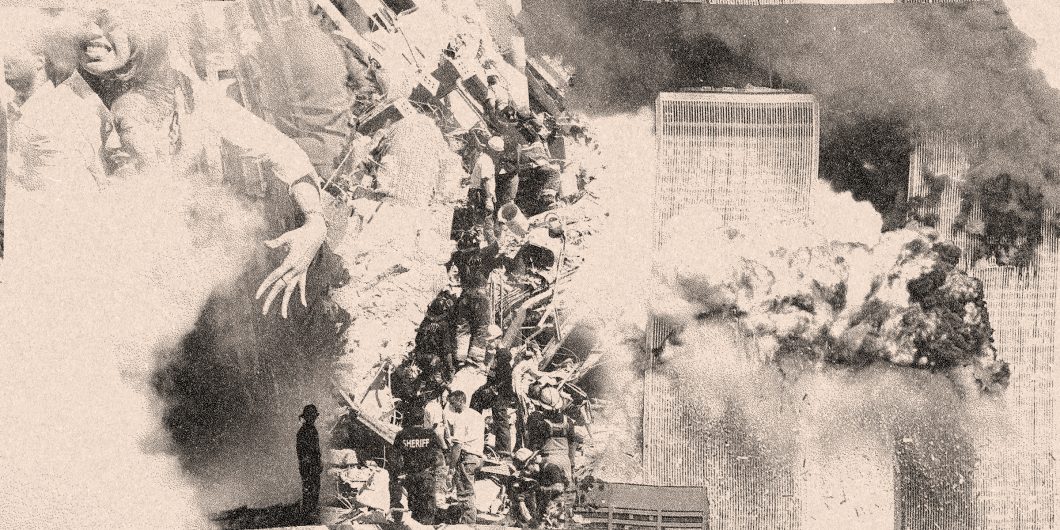We ceded so much of our children’s lives to the Department of Education and the Department of Everything-Else that we forgot what responsibility felt like.
Things Left Undone
My piece opening the Law & Liberty Forum on the anniversary of September 11 focused on how people experienced that terrible day. Shock from this monumental catastrophe broadcast live on television shaped responses to the attacks in an unprecedented way. Did those responses understand the problem correctly and effectively promote American national interests? Public consensus in the United States largely supported or went along with measures including counterterrorism at home and interventions abroad. The botched withdrawal from Afghanistan that reached its climax after my piece had been written and circulated puts a sharper edge on questions that prompted a lively exchange among contributors to the forum. Let me address in order some points they raise before returning to my own conclusion.
Closing Minds
Along with the substantive issues he raises, Paul Miller’s response makes an important contribution to the forum by recalling the tone of discussion from around 2004 when efforts in Iraq faltered through the next ten years. Within the Republican Party and movement conservatism, including think tanks and publications, raising concerns, let alone criticizing policies or their implementation amounted to disloyalty. An older friend involved with national security since the 1960s remarked to me at the time that it reminded him of the feverish tone in Washington during the latter stages of the Vietnam War. Insiders noted a chilling effect reinforced by quiet hints and targeted dismissals. Ross Douthat reported in a recent New York Times column that his college friend Elbridge Colby had been blackballed from advising Jeb Bush’s presidential campaign as a late echo of the phenomenon. Defensiveness reinforced groupthink and precluded reassessment in ways not apparent to the wider public, but that those who saw it recognized the dynamic at the time. The policy could not fail on its merits, it could only be failed by lack of resolve or resources.
Scott Silverstone accordingly makes a valuable point about the need for “safe political and intellectual spaces for patriotic dissent that won’t ruin reputations or careers.” The Cold War “Team B” exercises run in the 1970s by the CIA to check assessments of the Soviet Union offer one precedent with the robust exchanges between Winston Churchill and British service chiefs during World War II another. What Silverstone rightly calls “politically charged recriminations” over who gets blamed for failures does nothing to avoid or at least minimize them. Nor does ignoring uncomfortable reports. An effective dialog within both the chain of command and between military and civilian authorities makes it possible to recover from setbacks and adapt as circumstances change. How the process works matters less than that it happens. The alternative undermined both effectiveness and morale.
Disparate Threats & Responses
Miller and Rebecca Burgess rightly note that 9/11 was neither the first nor last jihadist terrorist attack on the United States or American interests overseas. Episodes in that story before 9/11, particularly an abortive plot to bring down the World Trade Center, failed to put terrorism on the agenda. More broadly even where they affected Americans, hardly any of the 500 terrorist hijackings and over 4,000 bombings from 1968 to 2001 occurred within the United States. Indeed, Condoleezza Rice’s observation on a recent Hoover Institution panel for the twentieth anniversary of 9/11 that she had thought of terrorism as “over there” rather than a problem at home expressed a widely held assumption that long shaped perceptions and policy which changed as smoke rose from Manhattan and the Pentagon.
The scale and scope of 9/11, which soon afterward Niall Ferguson thought of as more akin to the Blitz than Pearl Harbor, set the day apart from other terrorist attacks and drove the response. Details of the plot also show how difficult it would be to repeat. Jihadists share rage against those who resist their view of Islam, but their actions take various forms which pose different threats and that need to be met on their own terms. Lone wolves—like the Tsarnaev brothers behind the Boston Marathon bombing—act on their own without help from groups. It makes them harder to detect, but also limits their damage. The episodes Miller cites in the United States by radicalized individuals and couples from outside the country, along with 9/11 itself, points to the importance of border security and immigration controls in keeping threats at bay. Indeed, stricter oversight might have caught the 9/11 conspirators before they could strike or kept them out of the United States. Larger jihadist attacks have been overseas with relevant governments taking the lead in countering them and even substantial ones differ from the situation where power vacuums allow groups like the Islamic State to operate.
How then to meet these disparate threats? Declaring war on a tactic—terrorism—frames the problem the wrong way and applies blunt force to circumstances requiring precision. It also fails to make clear what victory means or set a measure for determining success. The United States has exceptional capacities in surveillance and the financial spheres that have disrupted networks and countered plots. Military action serves an important purpose in some cases like Afghanistan right after 9/11, but it is not the only tool or even the most useful. The fight against the Barbary Pirates offers a precedent, with the expectation that states police territory they claim to control as an important corollary that lays responsibility on local authorities best able to act effectively. Leverage multiplies force by bringing other stakeholders with a more effective reach into the effort and reducing American exposure. Policing is a local function that outsiders rarely perform effectively. Miller rightly notes that terrorists have agency, and countering extremist ideology poses a challenge best handled by those within their community who can reach potential jihadis and those who influence them. Diplomacy mobilizes shifting coalitions of the willing motivated by their own perceived risk and self-interest. Maintaining those coalitions should be a priority to share the burden of countering terrorism rather than make American responses a first resort. Those responses, moreover, must fit the particular circumstances rather than adopt a “one size fits all” to every threat.
Americans would never back committing forces numbering in the tens of thousands or more over decades. The oft-cited precedents of Germany, Japan, and South Korea, where states existed and Cold War imperatives kept troops in place, do not match the reality of Afghanistan and Iraq.
The Pursuit of Security
Assessing domestic counterterrorism involves looking closely at the structure and cost of a rapidly expanded institutional structure, effectiveness of specific measures, and civil liberties. None of these points stands beyond criticism. Heavy expenditure had a certain logic after 9/11, as Michael Mandelbaum points out, and it was hard to tell which lines in the budget delivered appropriate returns on the investment. As Frances Townsend acknowledged in a recent interview, organizational changes made under pressure sometimes turned out to be less effective than expected. Anyone with experience of bureaucratic or academic life knows how budgets set priorities that both agencies and outside bodies follow. Generous funding for projects on terrorism directed more work and attention to the subject. “Hyping the risk” had no part in a pattern that called for reassessment balancing cost and benefits from lessons learned since 9/11.
Many security measures had little or no benefit. Passenger and crew awareness, along with hardened cockpits, did more to protect air travel than other defensive precautions at airports. “Security theater,” like removing shoes and full-body scans for air travel, amounted to looking busy and showing that something was being done. Exceptions to these rules for some travelers suggest they weren’t vital after all. The intensity of enforcement faded, but with infrastructure like the Transportation Security Administration established unwinding them became difficult. Compliance seems a greater priority than security. Responding with an argument from authority inspires neither public confidence nor cooperation. Better to reassess procedures and rules for their effectiveness against convenience and cost than make temporary measures permanent. Surveillance and other counterterrorism efforts that touch on civil liberties, especially those of American citizens in the United States, merit even more scrutiny. Steps taken to handle terrorists abroad who fell outside both domestic criminal law and rules for lawful military combatants should not be applied at home. Some, as my piece noted, set dangerous precedents to be avoided. A recent tendency to classify domestic terrorism in overly broad terms only makes the risk here more apparent.
Recalibrating Strategy
The wars in Afghanistan and Iraq show the advantage held by those with something ready to do amidst demands in a crisis that something be done. Humanitarian interventions during the 1990s, along with plans to overthrow Saddam Hussein, provided the template adopted to fight terrorism. Anger and fear justified using them in ways that before lacked public support. Burgess suggests that I divorce war from politics which she casts at a very basic level as defending the community by distinguishing friend and foe. But politics understood as deliberation over both ends and means seems absent from the story. The consensus immediately after 9/11 backed firm action. Almost everyone supported invading Afghanistan to get Osama bin Laden and a wide consensus later backed invading Iraq. Only a few voices like Brent Scowcroft and Zbigniew Brzezinski urged caution, with other critics dismissed as isolationist or unpatriotic. Most Americans supported intervention or at least went along giving the Bush administration the benefit of the doubt.
Silverstone rightly notes in both cases the lack of strategy to translate power into political outcomes. Early success on the battlefield led to disappointment with a power vacuum followed by insurgencies that played to American vulnerabilities instead of strengths. Policies made by default rather than deliberation, which would have tested assumptions, substituted action for strategy. Intervention turned into nation building by default with unrealistic expectations for what even overwhelming military power could accomplish. Could more manpower, resources, or time have made a difference? The United States alone provided more funds than Afghanistan could absorb, and Americans would never back committing forces numbering in the tens of thousands or more over decades. Nor was an extended civil administration akin to colonial governance of an earlier period an option to stabilize areas. The oft-cited precedents of Germany, Japan, and South Korea, where states existed and Cold War imperatives kept troops in place, do not match the reality of Afghanistan and Iraq.
The analogy Silverstone draws between these interventions and the disastrous Sicilian expedition that brought the downfall of Athens in the Peloponnesian Wars makes a more apt comparison and highlights the dangers of groupthink. Americans did not suffer the same kind of catastrophe as Athens, but recent conflicts reveal important problems. Neither generals nor politicians have been held accountable for failures. Paul Yingling, a retired Lieutenant Colonel and Iraq veteran, pointed out in 2007 that “a private who loses a rifle suffers far greater consequences than a general who loses a war.” More recent events confirm the observation. Effectiveness and morale both suffer from leaders who fail upwards to lucrative retirement sinecures, university appointments, and television appearances. Indeed, unaccountability damages an already public fragile trust in institutions.
Not every trend over the past two decades involves post 9/11 foreign policy. Indeed, Burgess makes a telling point quoting Theda Skocpol about the decay of civil society where cross-class membership organizations responsive to communities have been supplanted by nonprofits staffed by trained professionals and funded by donors. There is no way to prove that absent the crisis brought on by those terrorist attacks other issues that I mention would have been addressed or resolved. But attention is a limited resource in government and public culture. Making one thing a priority leaves less time for others and consequently a vacuum in which problems grow. Watergate and the Clinton impeachment show how scandal can dominate politics. Barack Obama’s focus on the health care program that later bore his name, like Donald Trump’s commitment to tax reform, excluded other priorities during the first year of their administrations. Invading Iraq pulled resources and attention from the hunt for bin Laden and stabilizing Afghanistan. Similarly, priorities set 9/11 and responses to it changed the agenda for more than a decade. Much else changed at the same time without a great deal of attention until problems became hard to ignore. Hence my attention not only to what was done, but also to things left undone in consequence of 9/11. Both sides of that equation bring the consequences into perspective twenty years later.


